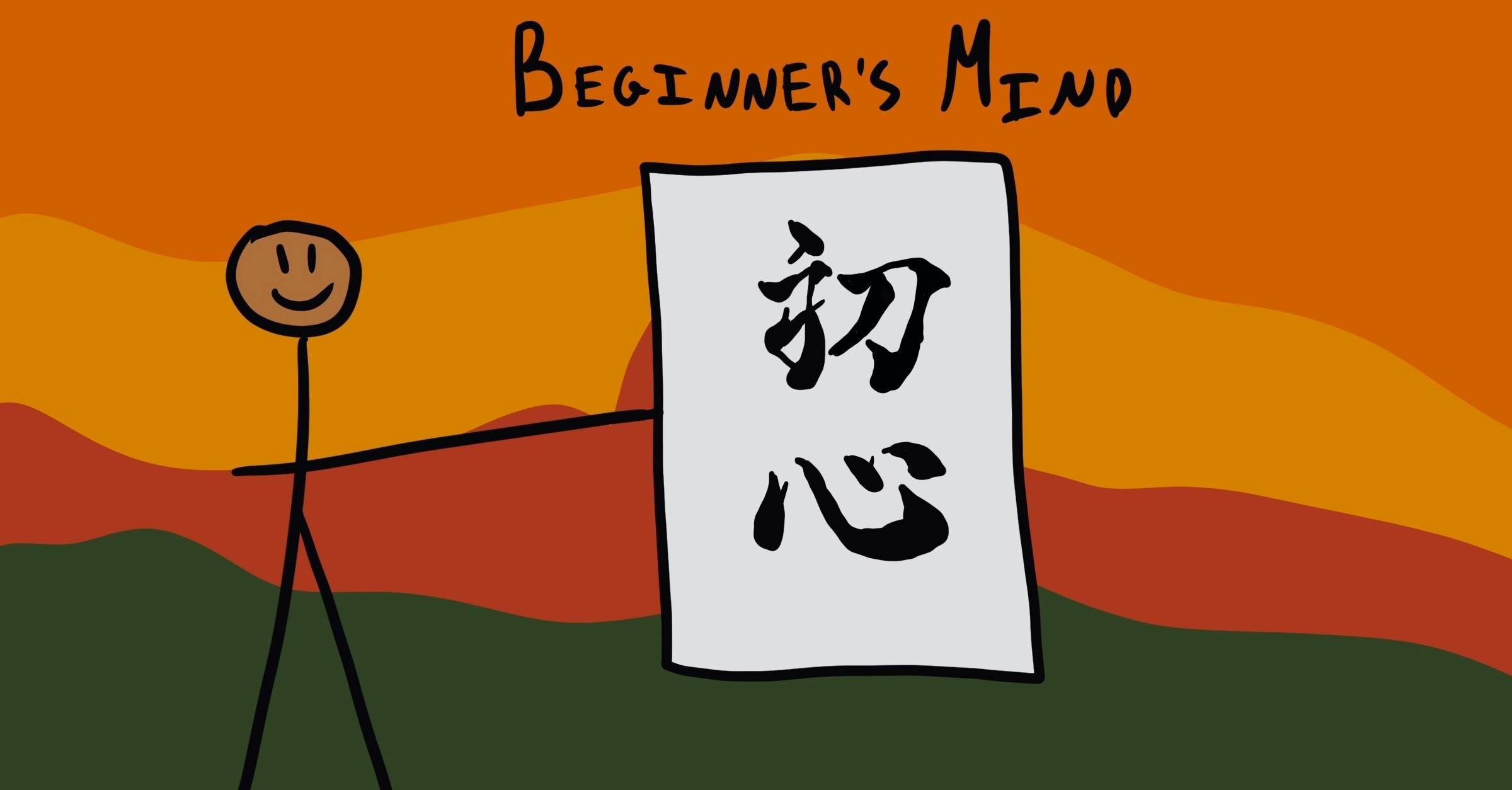The Beginner’s Mind
The Basic Idea
Have you ever noticed how the world was filled with wonder and endless possibilities in your childhood memories? But somehow, the same world doesn’t seem as limitless as an adult.
As kids, we approach life full of awe, as if every person, place, and thing we discover is magical and novel. But as we grow older and indulge in the mass array of perspectives and preconceived notions about the world, our outlook starts to sour, and it gets harder to feel that child-like sense of amazement.
The world we inhabit today is filled to the brim with opinions, informing our outlook on new subjects and ideas. This can be of great benefit: having a wealth of information available at our fingertips through search-engine data, countless media outlets, and constant social media has kept the average person more informed than ever. But this very same ‘expertness’ makes it exceedingly difficult to cultivate an unbiased perception in new interactions.
A concept that can help us return to an open state of mind is Beginner’s Mind: a Zen teaching used by many to remedy habits that reinforce limiting biases, and the kind of mindset we have as children.
This state of mind is characterized by an attitude of openness and eagerness, in which a lack of preconceptions allows a person to see everything as though it is for the first time.

In the beginner’s mind there are many possibilities, but in the expert’s there are few.
– Shunryu Suzuki, in his classic bookZen Mind, Beginner’s Mind1
Theory, meet practice
TDL is an applied research consultancy. In our work, we leverage the insights of diverse fields—from psychology and economics to machine learning and behavioral data science—to sculpt targeted solutions to nuanced problems.
Key Terms
Shoshin: A term from Zen Buddhist teachings referring to the act of having an open mind, letting go of all preconceived notions, and looking at every aspect of life from a fresh, untarnished perspective
Zazen: A form of seated meditation used in Zen Buddhism in congruence with the mind-state of shoshin, used to gain insight into the nature of being and to maintain a state of presence.
Original Mind: Referring to a state of mind that reflects the first incarnation of an activity, or one’s first attempt at understanding and practice. In Zen, the Original Mind is said to include everything within itself and is always rich and sufficient from its initial state.2
Confirmation Bias: The tendency to interpret new evidence as confirmation of one’s existing beliefs or theories.
History
The term beginner’s mind comes from Zen philosophy and was brought to the West in the writings and speeches of the Japanese Zen master Shunryu Suzuki.
His musings suggest that open-mindedness can foster the development of new skills, better decision-making tactics, and greater empathy, while an outlook riddled with all-knowingness (like that of an ‘expert’) is quite limiting in practice.
This is not to say that experience should be negated, but rather reapplied to each new circumstance with an open mind. The goal of a beginner’s mind is to temporarily let go of any learned ideas and concepts about the world so that you can approach a situation from a new perspective.
In Zen, open-mindedness and the dismissal of expectations are vital to the practice of meditation. The two avenues through which such a clear-headed state is achieved are Shoshin and Zazen.
Zazen is considered the heart of Japanese Sōtō Zen Buddhist practice and encourages the act of simply sitting and suspending all judgmental thinking – letting words, ideas, images, and thoughts pass by without getting involved with them. A physical state of being found through Zazen can then allow the subject to engage in Shoshin, dropping preconceptions and taking on an attitude of unbridled openness.
By the mid-1950s, Zen teachings had already gained a little headway amongst the American public. They especially resonated with the Beatnik community; the anti-materialist, soul-searching aspect of the Beat movement made Zen wisdom widely popular. Alan Watts’ literature on Zen and Buddhism began to spread far and wide, and with it, Shunryu Suzuki’s work began to gain traction among the Beatniks-haven institutions like The San Francisco Art Institute and The American Academy of Asian Studies.
Suzuki’s first lecture held at the Academy marked the beginning of Zen teachings truly entering the mainstream in American culture. Suzuki had the class engage in zazen for the first part of the class, which required they stare at a white wall for 20 minutes. With every class, little by little, more people showed up in the mornings to sit zazen for 40 minutes with Suzuki. The group that sat with Suzuki eventually formed the San Francisco Zen Center. 4 This sparked Suzuki’s long-held desire to teach Zen to Westerners and marked the beginning of an era of new-age spiritual classics that would permeate throughout North American thought for years to come.
People
Shunryu Suzuki
Born in 1904, Shunryu Suzuki was a Japanese Zen master of the Soto school who immigrated to the United States in 1958. He founded the Zen Center in San Francisco and Zen Mountain Center in Tassajara, California, the first Soto monastery in the western hemisphere.
When Suzuki first arrived in the United States, Zen teachings having already gained some popularity in the San Francisco artistic community, lectures on topics in Zen were beginning to be offered in the area and started to garner recognition. Soon enough, Wako Kazumitsu Kato— a fellow Zen Priest in the area—who had done some previous teachings at the Academy asked Suzuki to assist in a class he was giving there on Buddhism.3 What followed was decades of teaching, spreading awareness, and touching the lives of tens of thousands of people of Buddhist and non-Buddhist affiliation alike through his most famous work, Zen Mind, The Beginner’s Mind. The book contains a series of lectures and musings on various concepts within Zen teachings and has become one of the two most influential books on Buddhism in the West.
Consequences
Historical examples demonstrate how reluctance to release the expert mind can lead to closed-mindedness.
In 1912, German geophysicist and explorer Alfred Wegener suggested that the Earth consists of shifting continental plates—a proposition that stood in stark opposition to the contemporary wisdom of the day. He was ridiculed by fellow geologists and the global scientific community. German colleagues labeled his theories ‘delirious ravings’, while experts in the United States accused him of perpetrating pseudoscience.5 It would take several decades before the status quo was overturned and the accuracy of his theory was finally acknowledged. Unable to release the pre-existing biases they held, Wegener’s contemporaries suffered from the expert mind mentality.
A neglect of the beginner’s mind in place of the expert’s mind reaches beyond the realm of geophysics; the neuroscience community has faced the same kind of problems. Santiago Ramón y Cajal’s ‘harsh decree’– which suggested that humans that have reached adulthood are incapable of growing new neurons– endured for decades in spite of increasing contradictory evidence.6
The consequences of intellectual overconfidence continue in contemporary scientific debates. An example is a debate surrounding genetically-modified foods (GMOs), which have largely been deemed safe by the scientific community. Research has demonstrated that individuals who hold the fiercest anti-GMO views are the most likely to overestimate their knowledge on the topic.7 This overestimation of competence is explained by a psychological phenomenon known as the Dunning-Kruger Effect, and can have far-reaching implications on a systemic level.
Controversies
The road to achieving a beginner’s mind isn’t an easy one. One major obstacle is confirmation bias: we tend to seek out evidence that supports, rather than contradicts, our existing views. When our pre-existing beliefs influence which information we pay attention to, we’re more likely to ignore ideas that contradict our opinion, leading to less-informed decision-making.
By identifying and limiting these biases, we can train ourselves to replace our expert mind with a beginner’s mind by taking control of our critical thinking. When we notice ourselves jumping to conclusions, stopping to ask questions like ‘Why have I arrived at this conclusion?’ can help. One way to do this is by asking questions about your thought process: ‘Do I truly understand this issue in full?’, or ‘What if I am wrong?’ can short-circuit any confirmation-biased tendencies and encourage the use of our Beginner’s Mind.
Another common critique of the Beginner’s Mind is the implicit suggestion to neglect past experiences in favor of a clean slate approach when approaching new situations. But in fact, a true Beginner’s mindset encourages making use of past experiences, not rejecting them entirely, and instead of keeping an open mind on how to reapply them to each new circumstance.8
Case Studies
The Application of Beginner’s Mind to Cross-Culture Storytelling
Even beyond the workplace, harnessing the power of the beginner’s mind can work wonders in creating connections between people of different backgrounds, ethnicities, and lifestyles. In her work on exploring human interconnectedness, Professor Wendy Saver of Ball State University demonstrated that the creation of a space that emboldens individuals to value both their body and mind intelligence in equal measure is highly conducive to performative success.9 Cultivating a daily meditative practice and working to practice presence are some simple ways that people can do so. Saver suggests that in a productive learning atmosphere, maintaining a sense of quietude, inquiry, and earnest curiosity about others’ cultural paradigms creates a sense of equality, making room for every voice, and every opinion.
The Application of the Beginner’s Mind to Remedy Over-Competence Pressure
Studies show that perceived expertise can create illusions of competence and an unrealistically inflated sense of our own knowledge.10 Using non-knowing as a resource can be vital to a successful beginner’s mind. By accepting there is a limit to how much we can feasibly know, we can break out of mental routines conditioned by the pressure of having to know and instead embrace non-knowing. The fear that we might not know the right answer to a problem at work out of fear of humiliation or being wrong, for example, can lead to meetings lasting much longer than is needed because real or presumed not-knowing is being covered up by excessive conversation.
Expert culture teaches us that not-knowing is a no-no, but what if instead, we understood the beginner’s not-knowing as an opportunity for learning? What if we chose to ask simple questions like beginners do, wondering about what they’re seeing? Choosing to enter new encounters with people that deviate from the mental image we’ve constructed of them is another great application of the beginner’s mind. With an open mind, perhaps we see something about the other person that we never noticed before.
The Application of the Beginner’s Mind to Patient and Practitioner Relationships
In the health industry, listening with an open mind to a patient’s concerns and needs is crucial to quality treatment. A study of patient-practitioner relationships done by Dr. Louise Younie of Queen Mary University finds that the application of ‘beginner’s mind’ can help expert medical professionals to be present with their patients, approaching their case with a sense of curiosity and responsiveness in the face of the uniqueness of their illness. As every patient faces illness with a complex web of unknowns related to their personal health and history, remaining ready to work with the patient utilizing a beginner’s mindset can be helpful. Improvisation and openness not only benefit patients but could reconnect practitioners with their own humanity.11
Related TDL Content
The beginner’s mind can help prevent confirmation bias, our tendency to notice and emphasize evidence that aligns with our existing beliefs. This article explores the nature of this bias, how it can affect our perception of argument validity, and how it is encouraged by social media platforms.
Decision fatigue leads us further away from the beginner’s mind, as we tend to look for shortcuts to reduce the fatigue. This can make it more difficult to avoid biased reasoning. This article sheds light on the serious implications of decision fatigue and how it can impact parole decisions and our self-control. The piece also provides advice on how to prevent decision fatigue from occurring.
Sources
- Suzuki, S., Dixon, T., & Baker, R. (2006). Zen mind, beginner’s mind. Shambhala Publications.
- Suzuki, S., Dixon, T., & Baker, R. (2006). Zen mind, beginner’s mind. Shambhala Publications.
- Shunryu Suzuki-roshi and “Zen mind, beginner’s mind”. (2014, January 23). Ram Dass. https://www.ramdass.org/featured-teacher-shunryu-suzuki-roshi/
- Research guides: Buddhism: Zen: Contemporary masters & teachings. (2021, August 3). Research Guides at University at Buffalo. https://research.lib.buffalo.edu/buddhism/zen-contemporary-masters
- Conniff, R. (2012, May 31). When continental drift was considered Pseudoscience. Smithsonian Magazine. https://www.smithsonianmag.com/science-nature/when-continental-drift-was-considered-pseudoscience-90353214/
- Jarrett, C. (2020, May 18). How to foster ‘shoshin’. Psyche. https://psyche.co/guides/how-to-cultivate-shoshin-or-a-beginners-mind
- Fernbach, P.M., Light, N., Scott, S.E. et al. Extreme opponents of genetically modified foods know the least but think they know the most. Nat Hum Behav 3, 251–256 (2019). https://doi.org/10.1038/s41562-018-0520-3
- Power, R. (2015, November 16). 11 ways to develop a beginner’s mind. Inc.com. https://www.inc.com/rhett-power/11-ways-how-to-develop-a-beginner-s-mind.html
- Wendy Saver (2014) Beginner’s mind and cross-cultural storytelling, Voice and Speech Review, 8:3, 294-299, DOI: 10.1080/23268263.2014.949438
- Fisher, M. and Keil, F.C. (2016), The Curse of Expertise: When More Knowledge Leads to Miscalibrated Explanatory Insight. Cogn Sci, 40: 1251-1269. https://doi.org/10.1111/cogs.12280
- Younie, Louise. “Beginner’s mind.” London journal of primary care vol. 9,6 83-85. 8 Sep. 2017, doi:10.1080/17571472.2017.1370768


